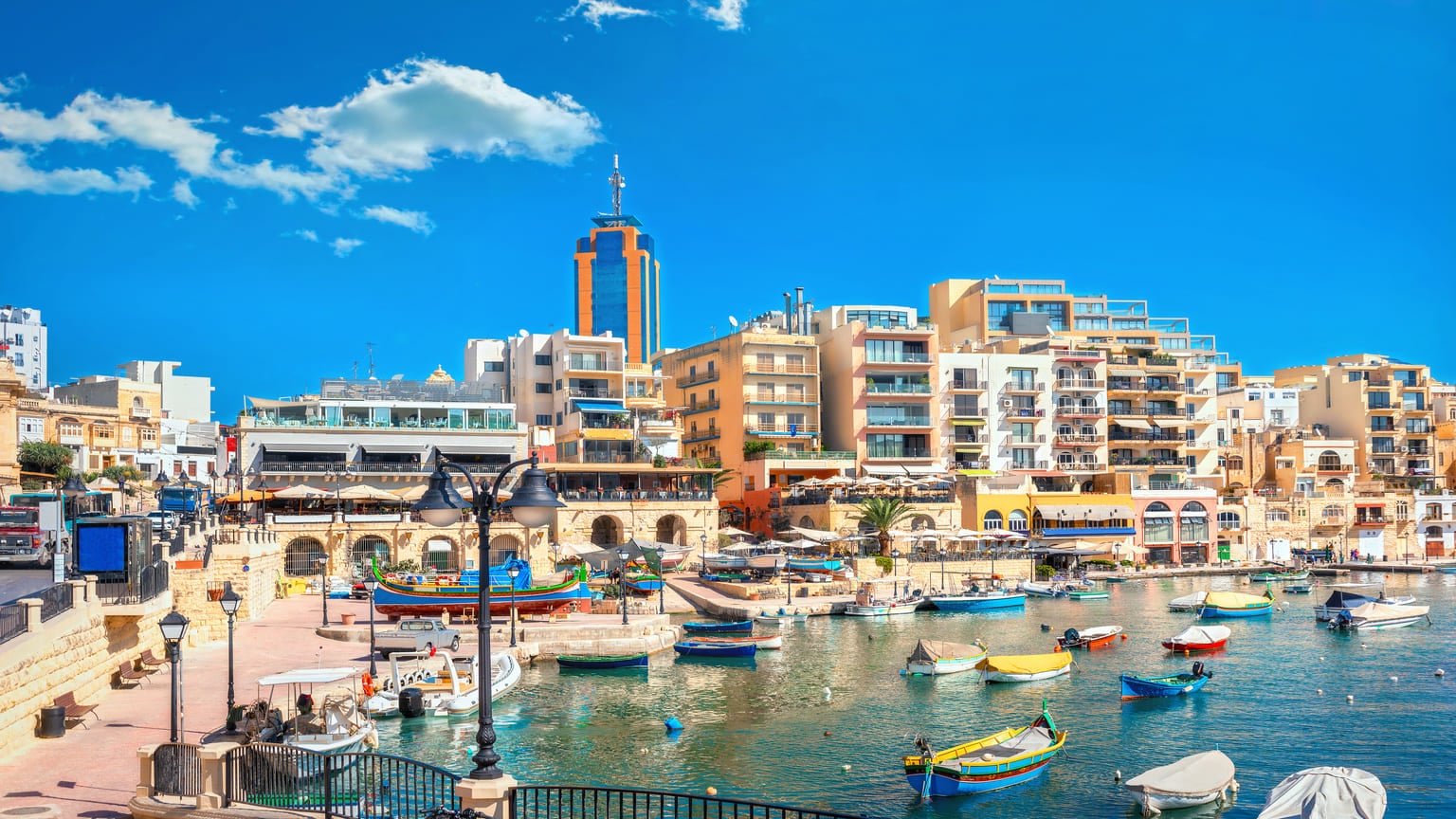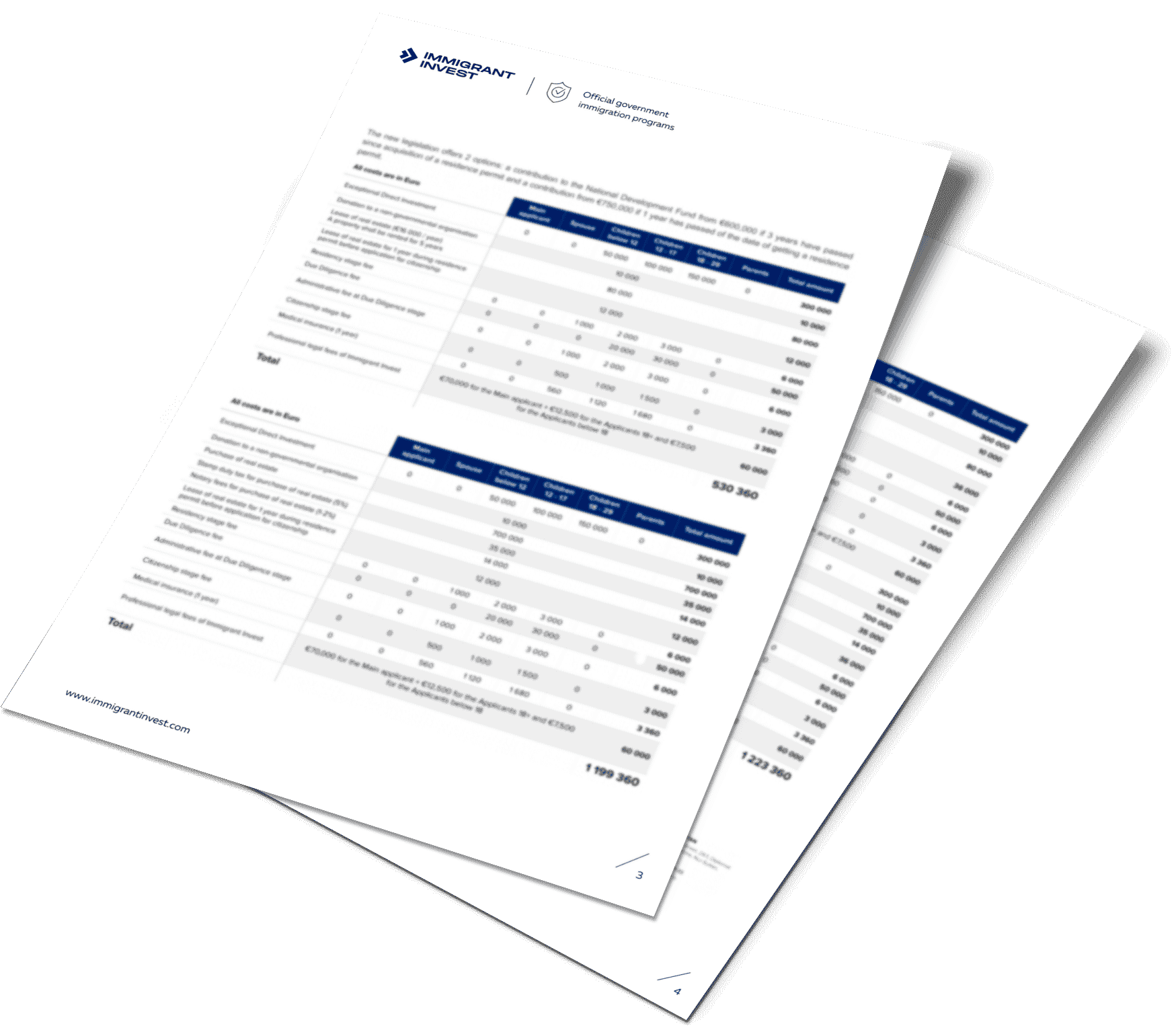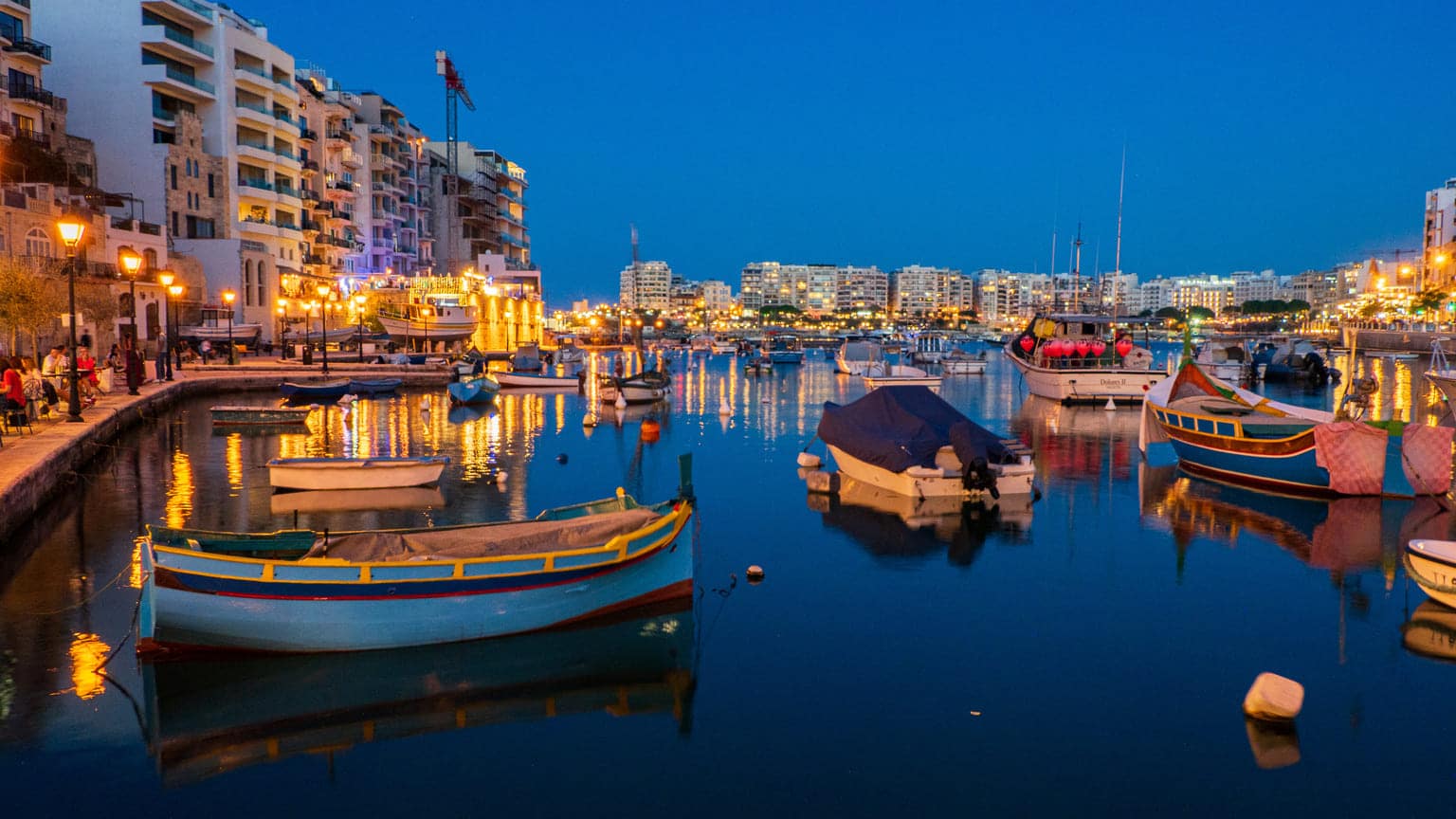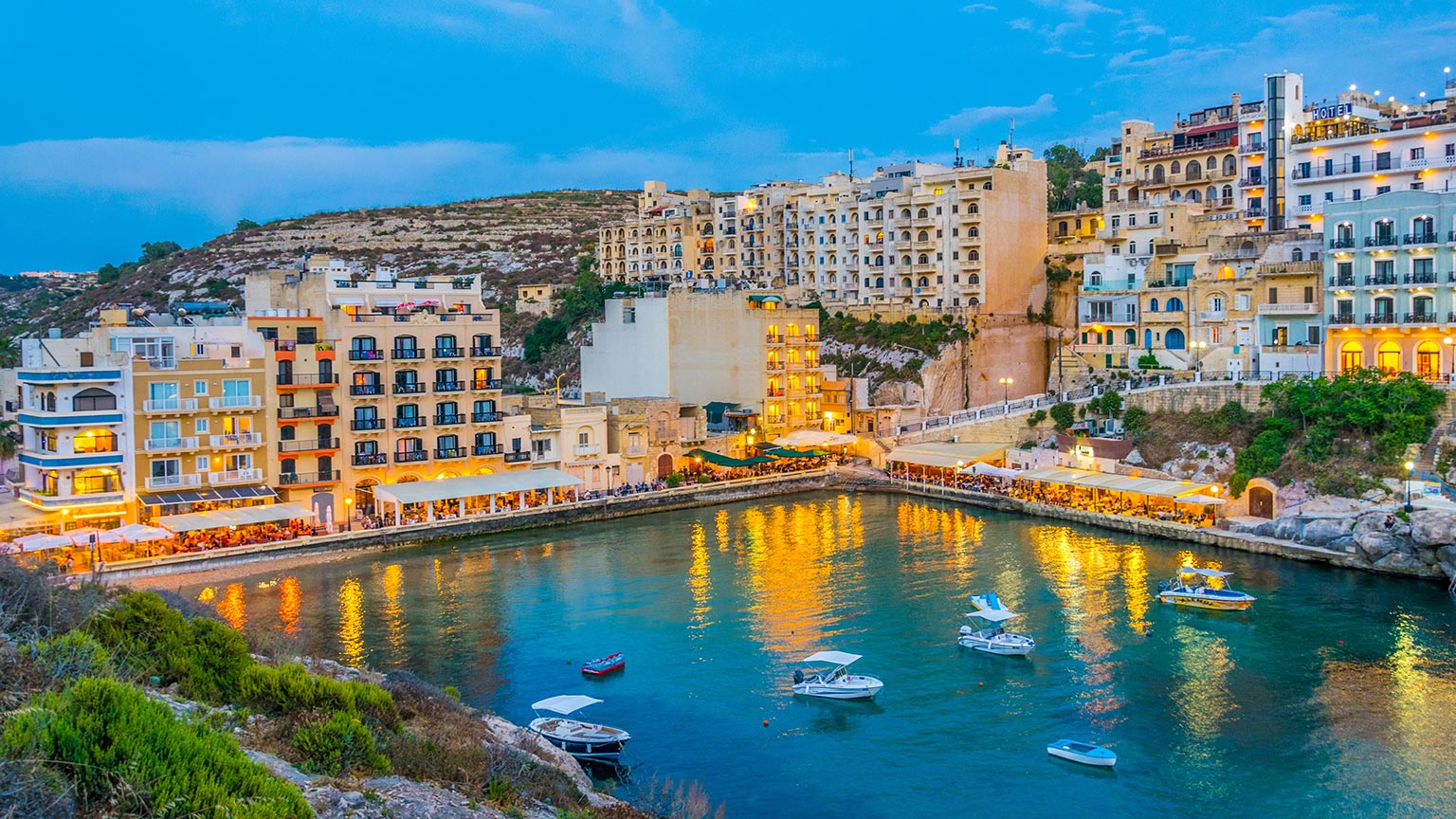Malta residence permits applications are usually processed by the Identity Malta Agency. There are two exceptions: a Nomad Residence Permit and a permanent residence by investment; they are processed by the Residency Malta Agency.
Malta residency by investment
Requirements for applicants. The Malta Global Residence Programme (GRP) is intended for individuals from non-EU countries. Investors over 18, with legal income, conversational level of English or Maltese, and no criminal record or prosecution may apply for Malta residency.
An investor may include a spouse, children under 25, siblings, parents and grandparents in their application. The household helpers working for the investor’s family for at least two years may also apply for a residence permit.
Costs. Investors rent or buy residential real estate for themselves and pay an administrative fee to get a Malta residence permit. The costs depend on the area of the property and whether the investor buys or rents it. Also, purchasing medical insurance and paying for legal services are essential.
Participation in the program involves a special tax regime:
- 15% — tax on foreign income transferred to Malta;
- 0% — on foreign income not transferred to Malta;
- 35% — on income earned in Malta.
The minimum annual tax on foreign income transferred to Malta is €15,000. It includes the tax on the whole investor’s family income. The home staff can’t use the tax benefits, and their income is taxed with regular rates of 0 to 35%.
Principle costs for obtaining a Malta residency by investment
| Costs | Purchase of real estate | Rent of real estate |
| Residential real estate | €220,000+, if the object is in the south of Malta and the island of Gozo €275,000+, if the object is situated in other areas | €8,750+ a year, if the object is in the south of Malta and the island of Gozo €9,600+ a year, if the object is situated in other areas |
| Administrative fee | €5,500 to €6,000, depending on the property’s area | €5,500 to €6,000, depending on the property’s area |
| Medical insurance | €400+ for a person | €400+ for a person |
| Annual tax | €15,000+ | €15,000+ |
Obligations. Investors and their family members are not obliged to live in Malta to maintain their residency status. However, they should not spend 183+ days a year in any other country.
Also, the investors should always have housing, a rented or their own one.
The validity period of a Malta residence permit by investment is one year. It may be renewed an unlimited number of times.
To renew the residence permit, an applicant should submit a tax return before July 30. Then the applicant receives a confirmation on prolonging their special tax status and applies for the extension of a residence permit card.
Malta residence permit for digital nomads
Requirements for applicants. Freelancers and remote employees from non-EU countries may apply for a Nomad Residence Permit in Malta. Applicants should work for a foreign company, run a business abroad or offer freelance services to clients mainly outside Malta.
Also, the applicants for a Nomad Residence Permit in Malta should:
- earn €2,700+ a month, gross of tax;
- have a valid travel document — for example, a visa;
- have health insurance covering risks in Malta;
- buy or rent housing in Malta.
All the applicants undergo a background verification check to prove their eligibility.
Along with the main applicant, a Malta temporary residence permit is available for their close relatives:
- a spouse;
- minor children;
- adult children if they are economically dependent on the main applicant or are unable to cope by themselves due to a medical condition or disability.
Obligations. There is no residency obligation for nomads; they may live in Malta or spend most of their time in other countries. Also, they don’t pay taxes on foreign income if their employment is already taxed at the origin.
The application fee is €300 for each family member.
The validity period of a Malta residence permit for nomads is one year, and then it may be renewed. The maximum period of residence in Malta with this type of permit is three years.
The application processing time is up to 30 days, so nomads should apply for renewal no later than a month before the permit expires.
Malta residence permits for employment
Foreign employees and self-employed may obtain a visa or a residence permit in Malta. The most common types of documents are a Single permit and a Blue Card.
A single permit is one of the most common ways of immigration to Malta. It allows you to reside and work in the country legally. To apply, you need a job offer from an employer in Malta.
The validity period of a single permit is one year, and then it may be renewed. The processing time is 90 days, and a renewal application may be submitted if a Malta residence permit card is still valid.
There is a fast-track procedure for highly-specialised professionals — the Key Employee Initiative (KEI). In normal circumstances, the proceeding time is no more than five working days. To apply for KEI, you need:
- to earn €30,000+ a year;
- to submit copies of relevant qualifications or confirm a necessary work experience;
- to provide a declaration from your employer if the applicant has the credentials needed to perform their duties.
The EU Blue Card is a temporary residence permit intended for highly qualified professionals. An applicant must:
- have a job offer or a contract with a duration of at least one year;
- earn at least 1.5 times more than an average annual salary in the country due to the contract;
- submit documents confirming the relevant high professional qualification, for example, higher education diplomas;
- have a valid travel document and a visa or a residence permit;
- get health insurance.
The Blue Card is valid for a year and may be renewed. If the remaining work period under your contract is less than a year, the permit will be prolonged for that time plus three months.
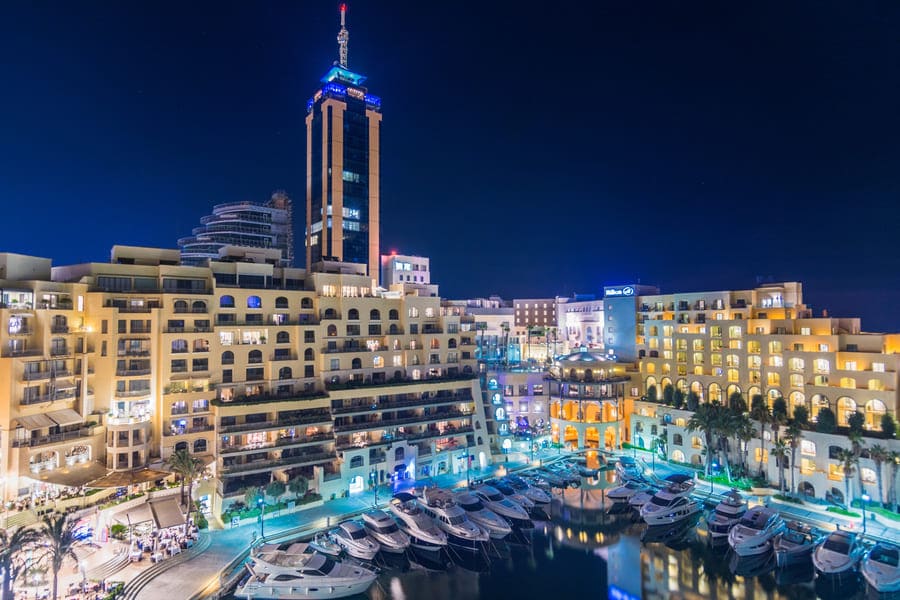
Malta residence permits for students and researchers
Students may obtain a Malta residence permit if they have a full-time course leading to higher education qualifications. One can apply if they have the endorsement of a university.
A student residence permit in Malta is valid for a year or the duration of the studies. An application should be submitted in advance because it will be processed for up to 90 days.
Researchers may apply for a Malta residence permit if a Maltese research institution selects them to conduct research. A doctoral degree or an appropriate higher education qualification is required.
The resident permit for a researcher is valid for a year or the duration of the hosting agreement. To renew the permit, one should apply no later than 30 days before the authorisation expires.
Malta residence permit for family reunification
A family of a third-country national living in Malta. If you have lived in Malta legally for two or more years and have a residence permit valid for at least one year, you may apply for residency for your family members:
- a spouse over 21 years old;
- unmarried minor children of both spouses.
A sponsor should provide proof of having a stable income and health insurance for each family member.
In some cases, there might be exemptions. If a Malta resident’s situation differs from the regulations’ requirements, their case will be considered individually, depending on the sponsor’s merits, income and other circumstances.
A third-country citizen in a relationship with a Maltese national may get a residence permit if they provide evidence of a steady relationship. These might include flight tickets, photographs, utility bills, and affidavits from family members confirming the long-term relationship.
Each residence permit will be valid for six months during the first two years. This type of permit doesn’t allow one to work in Malta, so if its holder wants to get a job, they should apply for a single permit.
A foreign spouse of a Maltese citizen and their children under 21 may apply for an exempt person status in Malta. They get a residence sticker issued by the Citizenship and Expatriate Affairs Department, which confirms they are family members of a Maltese citizen and allows them to live in Malta and travel to the Schengen Area visa-free. No fees are charged for this type of residence permit.
A Maltese citizen’s spouse may apply for the country’s citizenship after five years of marriage. Widows and widowers may also get Malta citizenship if five years have elapsed from the date of their marriage.
Other ways to acquire a Malta residence permit
A temporary residence permit in Malta may be obtained for some reasons other than employment, investment, or marriage. One may apply for a residency card if they:
- want to get a permit as an economically self-sufficient person;
- need long-term medical treatment in Malta;
- participate in special governmental programs, for example, the Malta Retirement Programme;
- move to Malta as refugees or need a Subsidiary Protection status.
A Malta residence permit may be issued for some other purposes. If a foreigner has a significant reason to move to Malta that is not listed in legislation or official sites, then they may apply for residency. Such requests are assessed individually on a case-by-case basis.
How to get a Malta permanent residence permit
Living in Malta. Malta PR is available for foreigners who have lived in the country legally for a minimum of five years. Also, there are some requirements:
- to submit tax declarations for the last five years proving an applicant earned the national minimum wage and an additional 20% for each family member;
- to provide a certificate by a warranted architect that the applicant’s accommodation in Malta is regarded as normal for a family of comparable composition;
- to have health insurance for each family member;
- to prove integration measures have been taken: to confirm attending the “I Belong” course provided by the Directorate for Human Rights and Integration and a pass mark of at least 65% in Level 2 Maltese language certificate.
Long-term residency is a permanent status, and a Malta residence permit card is issued for five years.
Malta PR by investment. Malta Permanent Residence Programme allows non-EU investors to obtain a lifelong permanent resident status. This route is much faster than the previous one: investors are not required to live in Malta and take integration courses before submission of their applications.
Investors should be over 18 years old, have no criminal record, sanctions or visa denial, and have legal income and health insurance to apply for Malta permanent residence. They may include in the application:
- a spouse;
- unmarried children of any age;
- parents and grandparents.
Adult children, parents and grandparents should be principally dependent on the investor or the spouse.
There are several investment conditions to fulfil to get a Malta permanent residence permit:
- Rent of real estate in Malta for five years. The minimum sum of the deal depends on the region where the housing is located: it is €10,000 annually for objects in the south of Malta and the island of Gozo, and €12,000 a year for objects in other areas.
- Purchasing real estate in Malta is an alternative option to renting housing. The minimum prices are €300,000 for objects in the south of Malta and the island of Gozo and €350,000 for objects in other areas. You should hold it for five years, and, in some cases, you may rent it out.
- An administrative fee is €40,000.
- The government contribution is €58,000 if you rent real estate and €28,000 if you buy it. An additional €7,500 are paid for each parent or grandparent in the application.
- A charitable donation of €2,000 is paid to a local non-governmental organisation.
Also, an investor has to prove to own assets of €500,000, including €150,000 of liquid financial assets.Real estate to purchase for getting a Malta permanent residence permit
The application processing time is 4 to 6 months. About a month or two in advance is needed to prepare all the necessary documents; fulfilment of investment conditions and getting final approval may take up to nine months after the Due Diligence check.
Malta permanent residence is a life-long status. Investors should renew their residency cards every five years and always have a registration address in Malta. After the first five years of residency, you may buy or rent any housing without a minimum price limit.
How to benefit from the special tax regime and visa-free access to Schengen with a Malta residence permit
Obtaining Malta PR by investment: a step-by-step procedure
1. Preliminary Due diligence. To participate in MPRP, applicants have to turn to the program’s licensed agent. The agent conducts a preliminary check to ensure that the investor may apply for Malta permanent residency.
In Immigrant Invest, the applicants’ documents are checked by certified Anti Money Laundering Officers. The check’s results help us collect a full package of documents for each case and increase the chances of approval. Usually, the check takes one working day.
2. Collection of documents. Immigrant Invest lawyers help the investor to prepare all the necessary documents for the application. They translate the documents into English, notarise copies and fill out government forms.
3. Submission of application and Due Diligence. The documents are submitted to the Residency Malta Agency. The applicant pays a non-refundable administrative fee of €10,000. Then the agency conducts Due Diligence, which usually lasts four to six months.
4. Fulfilment of the investment conditions. The remaining €30,000 have to be paid in two months after the approval is received. Renting or buying a property and paying a government contribution may take up to eight months.
When the conditions are fulfilled, the Immigrant Invest lawyers submit the supporting documents to the Residency Malta Agency.
5. Submission of biometrics. Investors and their family members travel to Malta and provide their fingerprints.
6. Final approval. The Residency Malta Agency reviews all the additional documents and sends a notification on the final approval to the licensed agent.
7. Getting residence permit cards. Investors get their permanent residence permit cards by courier.
For the first five years, the Residency Malta Agency checks annually whether the investor still has required assets and accommodation in Malta.
Benefits of Malta residency
A Malta residence permit may give you some attractive opportunities:
- To live in Malta, a safe country with a warm climate, surrounded by the Mediterranean sea.
- To travel to the other Schengen states visa-free and stay there for up to 90 days out of 180.
- To work and run a business in Malta, if your residence permit type allows it. Usually, residents have to apply for a work permit to get a job in Malta.
- To have access to developed educational and healthcare systems.
- To apply for citizenship after living in the country for at least five years: four of the previous six and a full year before submitting an application. But there’s a pitfall: not every type of residency leads to Malta citizenship; for example, the one for digital nomads doesn’t. We recommend clarifying the conditions if you wish to get Malta citizenship by naturalisation.
Investors may also apply for Malta citizenship by naturalisation for exceptional services. At first, they obtain a residence permit and then apply for citizenship after one or three years of residency in Malta.
Frequently asked questions
You need to obtain a residence permit to move to Malta for up to a year or more. If you want to stay up to 180 days, a National visa may be more suitable.
Foreign employees, freelancers, students, spouses of Maltese residents, and investors may apply for a Malta residence permit. To do so, they need to choose the right type of permit, collect all the necessary documents and submit an application to the Identity Malta Agency or the Residency Malta Agency.
Malta Global Residence Programme is one of the most convenient paths to residency. It doesn’t require living in Malta for the most part of the year or looking for a job to move to the country.
Suppose you have a significant purpose for moving to Malta, for example, a job offer or an endorsement from a university, or you want to invest in the country. In that case, it is possible to get a Malta residence permit.
The procedure is not very complicated: you have to collect and submit all the required documents and get your residence permit after the approval.
The application processing time is usually up to 90 days. If you apply for a Malta permanent residence permit by investment, the Due Diligence may take four to six months.
With a residence permit, you may move to Malta.
The expenses depend on the type of residence permit you choose. For example, getting a Malta residence permit under the Global Residence Programme requires spending €35,000+ in total on housing, taxes and an administrative fee.
Yes, you may apply for Malta permanent residency after five years of legally living in the country. You’ll need to prove a stable income, knowledge of the Maltese language and take an integration course.
Malta Permanent Residence Programme is another path to a permanent residence permit. An investor rents or buys real estate and pays an administrative fee, a government contribution, and a charitable donation. Their spouse, children, parents and grandparents may also apply.
Malta permanent residency is a lifelong status. The cards should be renewed every five years.
Wealthy foreigners may apply for Malta permanent residency by investment if they meet the requirements:
- age over 18 years old;
- legal income;
- health insurance;
- no criminal record, sanctions or visa denials;
- assets of €500,000, including €150,000 of liquid financial assets.
Spouses, children, parents and grandparents may also be included in the application.
To get a permanent residence permit, an investor rents or buys real estate and pays an administrative fee, a government contribution, and a charitable donation. Applicants undergo a strict Due Diligence check.

